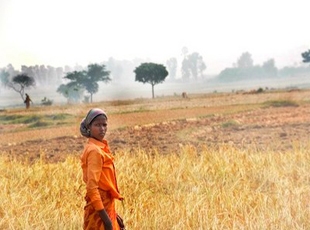Desh tribals face constant land grab threat from Muslims
@@NEWS_SUBHEADLINE_BLOCK@@
 Dhaka, July 10: Dandu Murmu, A tribal Santal day laborer, lives with his wife and three children in a dilapidated shanty in Thakurgaon district, northern Bangladesh.
Dhaka, July 10: Dandu Murmu, A tribal Santal day laborer, lives with his wife and three children in a dilapidated shanty in Thakurgaon district, northern Bangladesh.
Despite his mild manners, he has been facing criminal charges of theft, violence and land grabbing for nearly four years.
Over a decade ago, Dandu’s father borrowed 3,500 taka (US$ 45) from Muslim brothers Muhammad Hafizul and Khorshed, offering 1,300 sq.ms of land as security. Dandu insists a verbal promise was made that the land would be returned upon payment of the debt.
“I saved the money to release the land,” he says. “But the Muslims claimed they had bought it from my father. They beat me and chased me away.”
The brothers then filed a case against Dandu and he was arrested. After two weeks in jail he was released on bail. But ownership of the land, which Dandu needs to grow crops, still remains unresolved.
Dandu claims to have documents that prove his ownership and says the brothers have yet to show theirs. “They have extended the deadline for submission of their documents time after time, in order to prolong the case,” says Dandu, who has now spent over 25,000 taka (US$ 321) on the case; money he can ill afford.
But one of the brothers, Mohammad Hafizul, sticks to his story. “We didn’t occupy the land, we bought it,” he says. He adds that “we will submit our land purchase document to the court soon,” although he declined to show it to ucanews.com.
According to reports long running land disputes like this one are all too common in northern Bangladesh, a region where 1.6 million ethnic tribals live uneasily among the Muslim-majority Bengali people. These tribal people either follow their own indigenous religion or profess Buddhism.
Most tribals migrated to the area during British rule to work as railroad workers and agricultural laborers. The British gave them land to live on and cultivate, but mostly with nothing more than verbal permission. This paperless allocation has led to many of the current conflicts.
“Tribal people are mostly illiterate and know little about land issues. They may have possessed the land for generations, but many of them don’t have documents,” says Rabindranath Soren, president of National Adivasi Parishad, a tribal rights body “The money lenders and land grabbers take advantage of their ignorance.”
Soren estimates that every single tribal in the region who has some land is constantly under threat from land grabbers. Lawyer Imran Chowdhury says the real figure is not far off Soren’s estimate.
“About 10,000 tribal people have migrated to other districts and Indian states due to attacks from land grabbers,” he says. “Tribal people often fail to regain their land because they don’t have money or power.”
Sameer Dutta is not short of either. Secretary of the local Awami League Party and son-in-law of a government minister, he is charged with 15 counts of land grabbing. He strenuously denies all charges.
“I haven’t occupied anyone’s land, let alone land belonging to tribal people. These are false allegations to tarnish my image and political career,” he says.
A government official in Thakurgaon says that the administration is sympathetic to tribal people but it can do little. “Land grabbers are influential people,” he says. “They have money and often the backing of political parties. It’s very difficult for us to go strongly against them.”
(With additional inputs from Agencies)